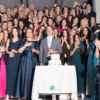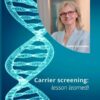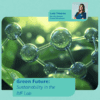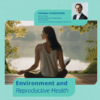
“Should women on menopause give up on their dream of having a child? The answer is NO.” explains Dr Michalis Kiriakidis, MD, M.Sc., Gynecologist in Assisted Reproduction, Deputy Scientific Director of Embryolab, on the occasion of October, Menopause Awareness Month, at the initiative of the International Menopause Society (IMS).

Menopause is a natural phenomenon that marks a transitional period of life. This happens in average around 50 years of age, yet some women will face this change earlier. Some will experience menopause as early as their 30s. Most women in perimenopause will see irregular periods both in length and frequency. This may be accompanied by symptoms like hot flashes, mood swings or night sweats. It happens because the ovaries produce less hormones (estrogen and progesterone). Eventually, these hormones will drop and remain so low that the ovaries will stop ovulation and they will not release any eggs.
And although in previous decades some would describe this as “marking the end of a woman’s reproductive years”, the amazing scientific and technological advancement of assisted reproduction has helped millions of women to overcome this problem. Most people in modern societies focus on educational and professional development during their 20s and 30s. This creates the need for proper family planning, as active and vibrant women may choose to start their journey to motherhood in their 40s or early 50s.
The best way for women to prevent fertility decline that comes with age is to preserve their eggs. This has become possible due to the remarkable progress of cryo-biology. More and more women choose to freeze their eggs at a younger age and postpone parenthood for later in life when the circumstances are optimal for them. Egg-freezing technology has allowed young oocytes to survive for years and react as fresh when the need for family comes.
However, many would wonder what happens if this preventive action was not taken earlier? Is it time for postmenopausal women to dismiss their dream of motherhood? The answer is an emphatic NO. Millions of women will fulfill their dream of motherhood using young donor eggs. Successful IVF with donor eggs can certainly enable you to have a baby despite menopause. Moreover, the Greek legal framework enables us to help women up to the age of 54.
In order to be successful, it is important to rejuvenate and prepare the womb for the embryo. Hormonal replacement is necessary as the uterus will be inactive after menopause. Hormonal treatment for women will relieve the side-effects of menopause and restore the endometrial lining to an appropriate size and thickness for a healthy pregnancy.
In order to start this journey, you should consult a fertility specialist and a trusted IVF-clinic for guidance. Having safety and success in mind, Embryolab has designed a well-coordinated egg-donation program that has helped thousands of women conceive and start their family.





